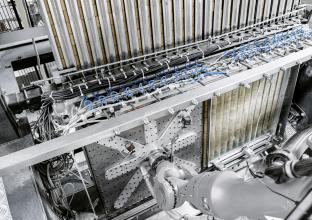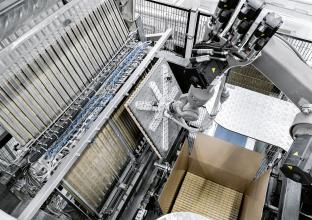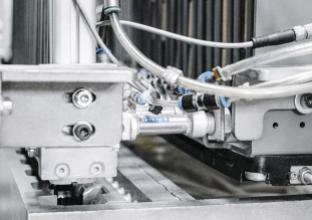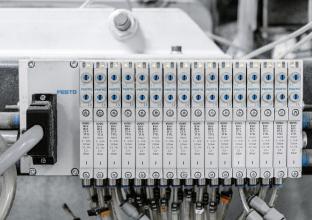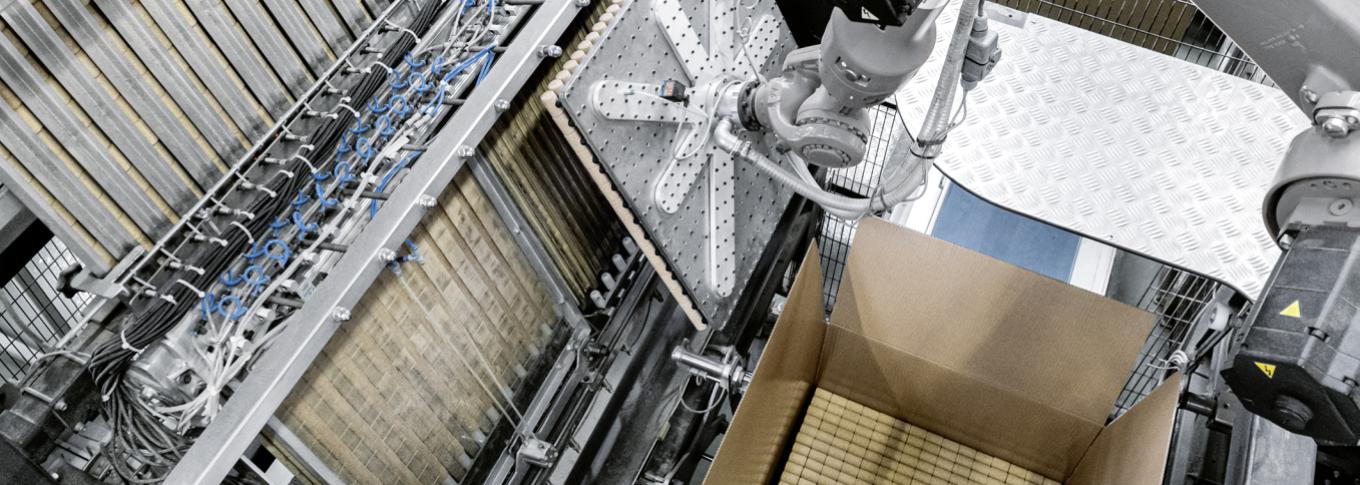
Save 30 per cent volume
Portugal is the cork world champion: with the largest acreage under cork oaks, the Portuguese are also the largest cork exporters worldwide. Although cork itself is light, it is all the more voluminous if it is packaged inefficiently. In order to save energy and CO₂ emissions during transport, the ESI Group developed a system for packaging corks that requires 30 per cent less packaging volume and does without plastic. On board: automation technology from Festo.
Traditionally, wines are sealed with corks, as the natural properties of cork allow the bottle to be sealed in a leak-proof manner and still allow the wine to "breathe" a little: There is minimal exchange with the surrounding air through the cork, which allows the wine to mature. However, the common way of packing corks in plastic bags and stacking them on pallets for transport is not the most efficient. The instability of the filled bags often complicates logistics and has a negative impact on the quality of the product.
This challenge was the breeding ground for the innovative solution of three Portuguese mechanical engineers around Gil Sousa, which led to the foundation of the ESI Group 15 years ago. The company developed an innovative robotic system for the packaging of corks that packs the corks in an orderly and space-saving manner in cartons. This reduces the volume for transport - compared to the usual bags - by 30 per cent. Gil Sousa explains: "This means a big reduction in logistics costs, which has a direct impact on the final cost of the product and significantly reduces the environmental footprint of transport."
Dusty production environment places the highest demands on components
ESI's patented solution consists of an autonomous cell and a palletising system with an articulated robot and pneumatic components from Festo. The production environment is dusty due to small cork particles. Therefore, the components must be very resistant in order not to wear out early due to friction with the dust particles.
The pneumatic cylinders from Festo meet these requirements. Due to their compactness, the small DSNU round cylinders are perfect for compressing the corks while they are sucked in by the vacuum cups and placed in the box. The 20 cylinders are controlled by the VTUG valve terminal. Despite its compactness, this small valve terminal is characterised by short reaction times and high flow rates and is energy-efficient at the same time.
2,200 components in the core programme
The automation components mentioned are part of Festo's core product range. These "stars of automation technology" include over 2,200 components from all levels of the pneumatic and electrical control chain - from compressed air preparation to valves, cylinders and accessories such as matching hoses and screw fittings.
Quickly available worldwide
Many star-awarded components are ready for dispatch in just 24 hours from receipt of order - configurable products within a few days. All products in the core range are available worldwide with consistent quality thanks to automated production at several locations.
"The partnership with Festo has existed since we were founded. Festo has given us technical support in the selection of components, provided us with material for tests and helped us validate concepts," explains Gil Sousa, now commercial director of the ESI Group. "Festo's components and solutions have helped us to create innovative solutions that have enabled our customers to increase their productivity and competitiveness."
Cork processors strive for sustainability
"This solution underlines the cork processors' commitment to environmentally sustainable processes," says Gil Sousa. "Less plastic and the saving of energy and pollutant emissions in logistics and transport also have a positive impact on costs and make the product more competitive."
About Festo:
Festo is a global player and an independent family-owned company with headquarters in Esslingen am Neckar, Germany. Festo has set standards in industrial automation technology and technical education ever since its establishment, thereby making a contribution to sustainable development of the environment, the economy and society. The company supplies pneumatic and electrical automation technology to 300,000 customers of factory and process automation in over 35 industries. The LifeTech sector with medical technology and laboratory automation is becoming increasingly important. The products and services are available in 176 countries.
With about 20,700 employees in over 250 branch offices in 61 countries worldwide, Festo achieved a turnover of around €3.36 billion in 2021. Each year around 7% of this turnover is invested in research and development. In this learning company, 1.5% of turnover is invested in basic and further training. Festo Didactic SE is a leading provider of technical education and training and offers its customers worldwide comprehensive digital and physical learning solutions in the industrial environment.
About Festo Spain/Portugal:
Festo Spain was founded in 1971, Festo Portugal in 2011. Today, the sales company with headquarters in Barcelona and Porto and a branch office in Bilbao in the Basque Country, has more than 190 employees and a turnover in 2021 of €75 million. It works with 139 distributors throughout the Iberian Peninsula. The most important industry segments are food and packaging, automotive and machine tools. For Festo, the Iberian Peninsula is the second most important automotive market in Europe after Germany. There are strong food & packaging OEMs, leading companies in flexible packaging as well as worldwide leaders in water treatment.

